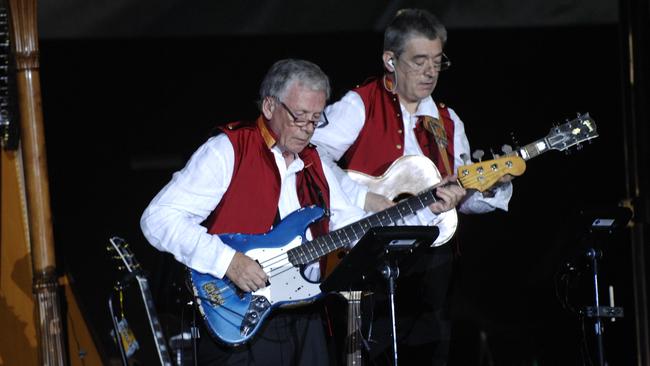Obituary: Herbie Flowers created the most famous bassline in popular music
Sounding deceptively simple, Herbie Flowers played the bass line backbone of Lou Reed’s only charting song, Walk On The Wild Side.

About once a decade a musical moment strikes so deeply our neurons can never delete it. It is universal, undeniable, beautiful, rare. These moments sound simple. They never are.
Four stand out. The opening chord of A Hard Day’s Night sounds all jangly Rickenbacker and bass, until you hear George Martin’s shadowy piano and Ringo’s hidden snare and cymbal. Phil Collins’ thunderous exclamation mark near the end of In The Air Tonight speaks for itself, but its accidental gated reverb drum sound makes the point. The “cello” lines Kate Bush plays on her Australian-designed Fairlight CMI synthesiser to push open her 1985 hit song, Running Up That Hill, is another.
Those ideas made serious money for their authors. The fourth made Herbie Flowers just £18. Sounding deceptively simple, he played the bassline backbone of Lou Reed’s UK-only hit, Walk On The Wild Side. The lyrics, about the wing nuts who hung around Andy Warhol in the late 1960s, might never have been heard but for the brilliance of Flowers launching it with not one bass line but two. It was David Bowie who invited his bass man to Trident Studios in London’s Soho to work with a New Yorker Bowie was recording. Primarily a jazz player, Flowers took his double bass and slid up and down the deep notes he believed suited the “dark” song he was hearing. Reed loved it. Flowers suggested he add an electric bass playing the same but 10 notes higher. Reed loved that too.
So did union man Flowers: he would be paid £9 for the session, double if he played two instruments. The song made No.10 in the UK, failed to chart in America and grazed the charts at No.100 for a week in Australia in April 1973. But it has become legendary, is played daily across the planet, while the music (but without Reed’s singing) featured in a famous Honda scooter advertisement in 1985 that was seen as breaking the mould when it came to counterculture music being used commercially. It is behind a national TV advertising campaign in Australia right now.
For Flowers it was another day at the office. He’d do several sessions a day all over London, and figured he might have done 20,000. He believed the artistic merit of most of the songs he played on – sessions included three solo Beatles, Bryan Ferry, Dusty Springfield, Elton John and Cat Stevens – was almost zero and he turned the radio off when they came on. It must have been a quiet house.
But he knew he had helped create three genuine masterpieces: David Bowie’s Space Oddity, Wild Side, of course, and it is his inventive basslines that elevate the international hit Justin Hayward had with Forever Autumn from Jeff Wayne’s Music Version of War of the Worlds. Wayne’s project was years in the making and recording, and Forever Autumn was the breakthrough that was followed by 15 million album sales, international stage productions and a film.
After school, Flowers was conscripted into the Royal Air Force, avoiding danger by playing tuba in the band, adding double bass because it won him a promotion. He played in a few London jazz ensembles and on the cruise ship Queen Elizabeth. On a stopover in Manhattan he somewhat reluctantly bought an electric bass, which he quickly put to use back home doing sessions with the top pop record producers of the day. They had all accidentally found themselves thrown together as the youth music boomed in the early 1960s. Then the Beatles turned up, moved to London and the capital became the cultural centre of the universe.
As pop evolved, a shallow glam scene emerged and then was overtaken by the sophisticated adventurousness of Bowie and Brian Eno. Flowers was there. He played in the final version of T Rex and was the touring bass player during Bowie’s Diamond Dogs era. He played bass (and tuba) with the bubblegummy Blue Mink whose racial harmony anthem, Melting Pot, went top 10 in Australia (but now is often banned from broadcast).
In 1978 he found himself working with Australian guitar virtuosi John Williams and Kevin Peek, percussionist Tristan Fry and keyboardist Francis Monkman, and the idea of a classical/rock band formed. Sky would go on to make seven groundbreaking albums of unique music, the first four of which topped charts here and in the UK.
Flowers formed some choirs in his home town of Ditchling, East Sussex and taught aspiring bass players, leaving them with the tip: “Don’t play somebody else’s lick, learn to read music, and listen to a bit of Miles Davis.”
Brian (Herbie) Flowers, musician. Born, Middlesex, England, May 19, 1938; died aged 86, September 5.




To join the conversation, please log in. Don't have an account? Register
Join the conversation, you are commenting as Logout